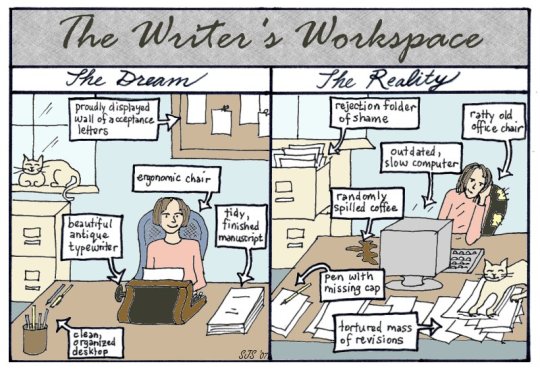Paul Whybrow
Full Member
This article suggests that writing in longhand or by typewriter is a more stimulating method of creating a story than skating the surface of a soft-touch computer keyboard.
Old-school writing tools will boost your creativity, concentration—and speed
We've previously discussed writing methods in several old threads:
Typing Skills
Typing vs writing longhand
That there may be 'hidden efficiency' in pen, pencil and typewriter ribbon is intriguing. I agree that I remember information better if I've written it down, which is partly why I jot ideas onto scraps of card that are dotted around my laptop's cooling cradle. I've got hundreds of documents stored in scores of folders on my desktop, which I'm sometimes glad to find while looking for something else, for I'd forgotten that I'd already done that bit of research!
I've written a few poems in longhand, but never anything in prose. I love relying on my laptop, which I also use to aid my concentration by playing music as I write. I even defy the common advice of not having an internet connection while I write, for sometimes it's best for me to get a fact right at that moment, rather than doing it in editing, as it will affect what I write next. I'm very focused, checking just that one fact and not wandering off to surf the web.
What about you?
Do you do everything on a computer?
Or by longhand or typewriter, afterwards producing a computer file?

Old-school writing tools will boost your creativity, concentration—and speed
We've previously discussed writing methods in several old threads:
Typing Skills
Typing vs writing longhand
That there may be 'hidden efficiency' in pen, pencil and typewriter ribbon is intriguing. I agree that I remember information better if I've written it down, which is partly why I jot ideas onto scraps of card that are dotted around my laptop's cooling cradle. I've got hundreds of documents stored in scores of folders on my desktop, which I'm sometimes glad to find while looking for something else, for I'd forgotten that I'd already done that bit of research!
I've written a few poems in longhand, but never anything in prose. I love relying on my laptop, which I also use to aid my concentration by playing music as I write. I even defy the common advice of not having an internet connection while I write, for sometimes it's best for me to get a fact right at that moment, rather than doing it in editing, as it will affect what I write next. I'm very focused, checking just that one fact and not wandering off to surf the web.
What about you?
Do you do everything on a computer?
Or by longhand or typewriter, afterwards producing a computer file?

